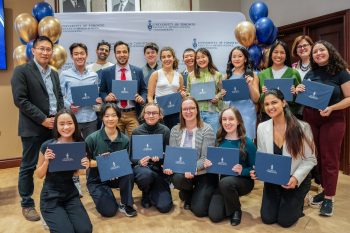Whether it’s turning canola oil into diesel fuel or a wristband that unlocks your smartphone with your heartbeat, the source of a truly transformational idea can often seem mysterious or coincidental.
Do they come from mentorship and training? Timely investment? A specially designed space? Or, the right mix of diverse people working together?
To engineering professor Jonathan Rose (ECE) and Professor Emeritus Joseph Paradi (ChemE, MIE), brilliant ideas come from all of the above – and they’re no accident.
Rose and Paradi are both leading initiatives at U of T – an engineering business minor and entrepreneurship certificate, respectively – aimed at encouraging students to grow new ideas into entrepreneurial ventures that equip students with the necessary skills to succeed.
“Sometimes,” said Rose, “you find the skills for success only when you learn how to fail. We give students a safe environment to try things out.”
U of T Engineering’s Sydney Goodfellow spoke with Professors Rose and Paradi about the importance of entrepreneurial education and how the Faculty is helping students realize their own game-changing ideas.
Why is entrepreneurship and business knowledge important for engineering students?
Joseph Paradi: Entrepreneurship isn’t just important; it’s endemic to the learning process. Engineers are inventors, innovators and builders by nature. We call it ‘applied’ science because we solve real-world problems that benefit mankind. It makes sense that what drives us to pursue engineering may also lead us to be interested in business. It’s a way to deliver – to apply – our results.
Jonathan Rose: The rate of change of technology and its applications are increasing exponentially, and engineers have the right skill set to drive this innovation, but it will also help them greatly to have some business knowledge. Learning about entrepreneurship and business creates opportunities for students to have an exciting career.
The Faculty offers an engineering business minor; how does it enhance the engineering curriculum and engage students with business and finance?
Rose: The Engineering Business minor works in partnership with U of T’s Rotman School of Management, and requires students to complete six relevant credits. This includes three courses in the fundamentals of finance, marketing, strategy and people management.
The minor’s goal is to introduce students to the language and concepts of business, so that they can participate in all discussions that happen in a company. What is a market? How do you know your idea is competitive? If there are competitors, what strategies do you need to stay on top? If you can inform technical knowledge with business knowledge, you’re already way ahead.
There is also an entrepreneurship certificate offered in U of T Engineering. How does it benefit the engineering student?
Paradi: The [Entrepreneurship] certificate serves as a tangible reflection of the fact that a student has gone through this intensive two-term course – one credit in fall and one in spring – that challenges them to shadow successful entrepreneurs, write business plans, learn the technical aspects of business and finance and much more.
In addition to the technical know-how, we also engage in less tangible challenges, posing ethical questions that encourage students to trust their instincts. In order to have confidence, it’s important for students to have a solid understanding and knowledge of business to draw from.
In addition to this minor and certificate, what are some other entrepreneurship initiatives and opportunities on campus?
Paradi: There are myriad opportunities on campus… Of course, there’s the [Entrepreneurship] Hatchery. Undergraduates are remarkably inventive; they don’t know what can’t be done, so they try anything. To encourage that innovational spirit, we’ve made all our resources available to them – hundreds of millions of dollars worth of tools and facilities, mentors, professors, teams of like-minded students – all available through the Hatchery’s program. At the end of the summer, these empowered students present a business idea to carry forward.
Rose: The goal of the Hatchery is exactly that, in 10 or 15 years, we’ll be able to look at graduates who are successful entrepreneurs and say that they had a formative and enabling experience at the Hatchery. It’s not about winning, or culling applicants and ensuring success, or combing for the next Zuckerberg, it’s about giving students an opportunity to try their ideas and see what works and what doesn’t – to experience potential failure and grow from it.
[The Hatchery] works in collaboration with a lot of other entrepreneurial ventures on campus, like the Institute for Leadership Education in Engineering (ILead), the Impact Centre, the Creative Destruction Lab and more. We create a community where students can learn from each other, network and share ideas.
What impact do you see U of T’s investment in entrepreneurship having on the Canadian economy?
Rose: The impact is crucial: the economy of the future rests on the start-ups of today. Technology is changing more and more rapidly, so there’s a risk in not investing in innovation. We don’t want to get left behind.
In Canada, we have everything we need to be a world leader in business – infrastructure, financial support and amazing institutions – but sometimes we can be conservative in our approach. We need to teach our students to take risks, be ambitious. With initiatives like the Hatchery, we are giving our students the confidence they need to challenge that conservatism and change the economy.
Paradi: We have to take charge of life, and take charge of Canada – we can’t give things away. That’s what entrepreneurship is about: improving our country.



